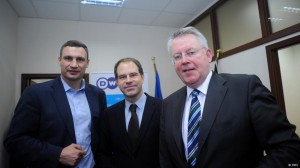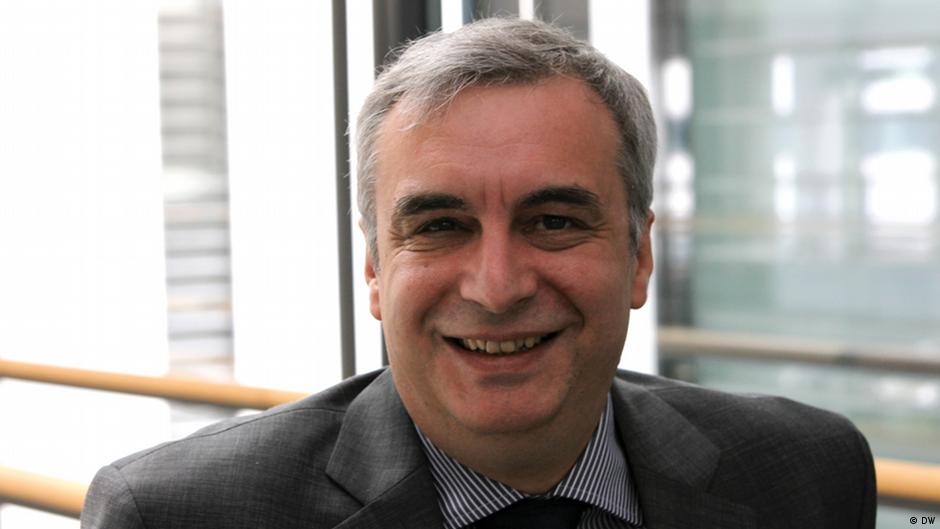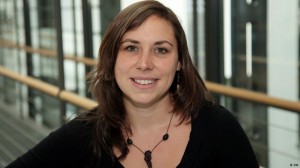Search Results for Tag: News
An important step to establishing fair and balanced coverage
At the end of 2013, DW recognized that the political tension in Kiev, Ukraine was something that deserved closer attention. DW reporters were on location at the Maidan when it was becoming clear that things were more serious than just public protest. In January 2014, as the situation escalated precipitously, DW released Geofaktor – a Ukrainian-language news magazine that provided a fresh perspective in what was quickly becoming an arena of misinformation.
DW remained a consistent and stable source of information as what began as a protest movement disintegrated into a geopolitical conflict with Russia at the center seeming to steer the region into chaos.
The latest step in DW’s commitment to covering Ukraine is the addition in January of a news bureau in Kiev run by DW correspondent Frank Hofmann. This expansion comes at a critical time just as the conflict in eastern Ukraine is reaching a new phase of escalation.
Coinciding with military conflict in Ukraine is a persistent and aggressive information war from Russia, which is being waged against “pro-western” media coverage. The Kremlin is pouring a lot of resources into a comprehensive international media strategy. The newly-released international online news and radio service Sputnik is at the heart of this. In Kiev alone, Sputnik is said to have a staff of 100.

Kiev’s Mayor Vitali Klitschko, DW correspondent Frank Hofmann and DW Director General Peter Limbourg
The importance of independent, objective international news like DW becomes all the more important in the fight against the flood of biased news outlets. Built on a tradition of objectivity, integrity and accuracy, international audiences can trust that the reports coming from DW’s Kiev bureau represent the highest standard of news.
Public discourse is still a contentious issue in modern Russia
 Guest commentary
Guest commentary
Boris Banchevsky, Head of Distribution for CIS
With the ongoing events in Ukraine and new international pressure building against Moscow, there is an acute need for accurate and objective information both domestically and abroad. As an international broadcaster based in Europe, DW can play an important role, not just through its own independent news coverage but also by supporting Russian media that tries to tell a different story than the state-controlled channels which are pervasive in the Russian media landscape.
There are a few points of light on the horizon for Russian journalism. TV Dozhd is one of the last truly independent media outlets in Russia and they also have recently added DW’s Russian-language news magazine, Geofaktor, to their programming catalogue. With this acquisition, DW can contribute directly to providing independent journalism to Russian audiences while making a statement for independent journalism.
TV Dozhd (“TV Rain” in Russian) first went on the air in 2010, operating in a Russian media landscape that was lacking impartial and independent news coverage. TV Dozhd’s audience grew quickly as they was doing what other channels weren’t– providing unbiased live broadcasts, interviews and independent global news along with critical, alternative coverage of important events and public personalities in Russia.
Despite this success, TV Dozhd nearly met its demise earlier this year after publishing an opinion poll asking if St. Petersburg (former Leningrad) should have been surrendered to the Nazis during World War II, in order to spare the immense loss of life.
Ostensibly for publicizing this question, nearly every major Russian cable and satellite provider dropped TV Dozhd, even after they removed the poll and apologized. As a result, TV Dozhd lost 90 percent of its advertising. According to an article written by Tikhon Dzyadko, the Deputy Editor at TV Dozhd, certain network heads revealed off the record that they were pressured to drop the channel by the Kremlin. TV Dozhd currently broadcasts online and charges a yearly subscription fee.
This proxy attack on independent journalism is no surprise in Russia, where many of those in charge see the purpose of the media as nothing more than a propaganda factory and real, investigative journalism is actively subverted both publically and in secret. The outspoken Russian journalist, Anna Politkovskaya, who was brutally murdered in 2006 for a still unknown client, comes to mind. She wrote in 2004 about her experience covering the Beslan school massacre by Chechen terrorists, “We are hurtling back into a Soviet abyss, into an information vacuum that spells death from our own ignorance. All we have left is the Internet, where information is still freely available.”
Now there is a new conflict being covered, but we also have more resources to tell the truth and publicize independent opinions. Independent media is critical for the development of a free society in Russia and through our active involvement, DW is making a statement that there should always be more than one voice telling the story.
Let’s get high-quality information to low-tech devices in Africa
Annelie Moreira Da Silva, DW Distribution Representative for Africa
Smartphones are fast becoming the standard tool for consuming news and information, but for many people in developing and emerging countries, this technology is still out of reach. It is estimated that out of the total 5 billion mobile users worldwide, only 1 billion are using smartphones. The remaining number represents a majority of people in emerging and developing countries who are using 2G or “feature phones” for mobile Internet access.
DW works hard to provide top-quality news and information to people in hard to reach places. In emerging markets such as in Africa, expensive Internet and mobile technology makes smartphones a luxury that few can afford. Most people try to use their feature phones to access valuable social networks and online news which usually demands a higher level of data processing than these devices can provide – but there are some solutions.
A innovative platform called biNu is providing a way for feature phones to efficiently navigate the web. And since June, DW has been cooperating with biNu to provide feature phone users in Africa with easy access to DW’s high-quality online news content.
The biNu app provides high-end functionality by turning feature phones with a basic Internet connection into “virtual smartphones.” It achieves this by using cloud networks to process and compress data from websites allowing the end result to be easily used via a feature phone. The result of using a cloud platform to streamline data is a service that is 10 times faster than a standard mobile browser while requiring 10 times less bandwidth. The displays are simplified and optimized for a feature phone and the most important elements of the website are passed on to the user.
The service already has more than 900,000 users in Africa, mostly located in fast-growing media markets like Nigeria, Kenya, South Africa and Ghana but also in countries like Zimbabwe and Ethiopia where, because of the difficult political climate, are harder for international media to access.
Even as infrastructure improves, the low cost of feature phones and continually expensive network and Internet access means that many people in these developing countries will continue to use their mobile phones as the primary device for going online. Providing them with easily accessible news, information and social networks is a hugely important task. Through cooperating with biNu, DW can overcome the disparity in international technological standards and provide information that people need on the device that they prefer.
Market roundup: December 2013
Asia
The Sydney-based culture channel Ovation is now a DW partner in Australia. The 15-year-old television channel is carried by all major providers and has a large fan base with programs that feature art, film, opera, history, culture and drama. Ovation will be adding Euromaxx, Arts 21, Europe in Concert, Discover Germany and Treasures of the World.
DW is also being broadcast now on the business and finance news channel, Business Plus, in Pakistan. It is the only channel of its kind in the country with a focus on business and economic issues. Euromaxx, DW’s lifestyle magazine will be aired daily during the evening program as an addition to the lifestyle segment. There are plans for more cooperation with DW in the future. The channel is broadcast nationwide via the Paksat-1 satellite and is carried by all major cable providers allowing for a potential audience of 12 million households in Pakistan. Outside of Pakistan, the channel is available in 52 countries. Business Plus belongs to the MTL media group.
The Vietnamese news channel VNews will be providing a monthly contribution to DW’s World Stories starting in January 2014. VNews is the television broadcaster of the Vietnam News Agency.
Europe
DW has added a new online partner in Greece. Since the beginning of October, DW has been providing full reports on Greek political and business news that are being featured on the popular business website capital.gr. The website covers finance, business and investment news while providing political analysis and background information. Capital.gr attracts a young audience with an average age of 35 who also have a high level of education and interest in socio-economic issues. The site is visited by around 1,250,000 users in Greece each month.
Market roundup: October 2013
Latin America
DW’s Portuguese science magazine Futurando now being broadcast nationwide in Brazil. The educational broadcaster Canal Futura will begin broadcasting DW’s successful Portuguese language science program Futurando on October 10. Canal Futura belongs to Globo, the largest media group in Brazil, and is the first private broadcaster in the country exclusively dedicated to educational programming. The channel has a technical range capable of reaching a potential audience of 94 million people in Brazil through terrestrial broadcasting in Rio de Janeiro and nationwide coverage on satellite, cable and affiliate stations.
A merger uniting the Colombian broadcaster and DW (Latinoamérica) partner UNE-ESM with the digital services provider Tigo has created formidable new presence on the Colombian media market putting the conglomeration in competition with Claro for first place.
Asia
Starting this month, DW’s English language news magazine Journal will be available nationwide in Afghanistan on Saba TV. The private broadcaster focuses on educational programming aimed at a young audience of information seekers. The channel belongs to the Saba Group, the operators of Radio Nawa which currently broadcasts the daily radio news program from DW in Pashto.
A new contract with the Indian public broadcaster Doordashan will place Manthan, a DW Hindi production, on six more of its regional channels.
The Taiwanese IPTV provider Vee Time is now offering DW’s flagship channel in English around the clock on Vee TV.
Middle East
Al Jazeera’s documentary channel has acquired a total of 99 hours of programming from DW Transtel’s portfolio. New programming aimed at the channel’s male target audience including extreme sports and motor sports will accompany formats covering science, medicine, nature, the environment and economic development. The documentary film channel from Al Jazeera broadcasts primarily in Arabic and can be received worldwide via satellite. Their core target area covers the Arab world.
Eastern Europe
Commentary and interviews from DW’s online service in Russian are now being featured on the popular Russian Internet portal Rambler.ru. The new partner website boasts 21 million visitors every month placing it among the most visited Russian language websites on the Internet. Since the beginning of the partnership with Rambler, DW Russian has recorded a clear increase in the number of online users.
The Ukrainian online news portal, Facenews.ua, which was founded in June, has also integrated content from DW’s Russian and Ukrainian news departments into a DW content box on their website.
Africa
DW content is now being featured on Radio Tumaini and Tumaini Television as well as the group’s online portal. In addition, a Global 3000 content box is now featured on Radio WA’s homepage in Uganda. Radio WA has been broadcasting DW’s English radio program Africa Link since 2012.
Online
DW’s international news and current affairs content is available in four languages on the world’s largest free online television website FilmOn.com. Alki David, the eccentric and controversial billionaire owner of FilmOn.com said they were delighted to able include DW’s “authoritative and highly engaging” content on the pioneering web service which provides television content streamed online and on-demand. The partnership brings DW into the fast growing market of on-demand internet TV and into an exciting new area of distribution. FilmOn has 45,000 hours of total video, all which are updated on a rolling basis.












Feedback